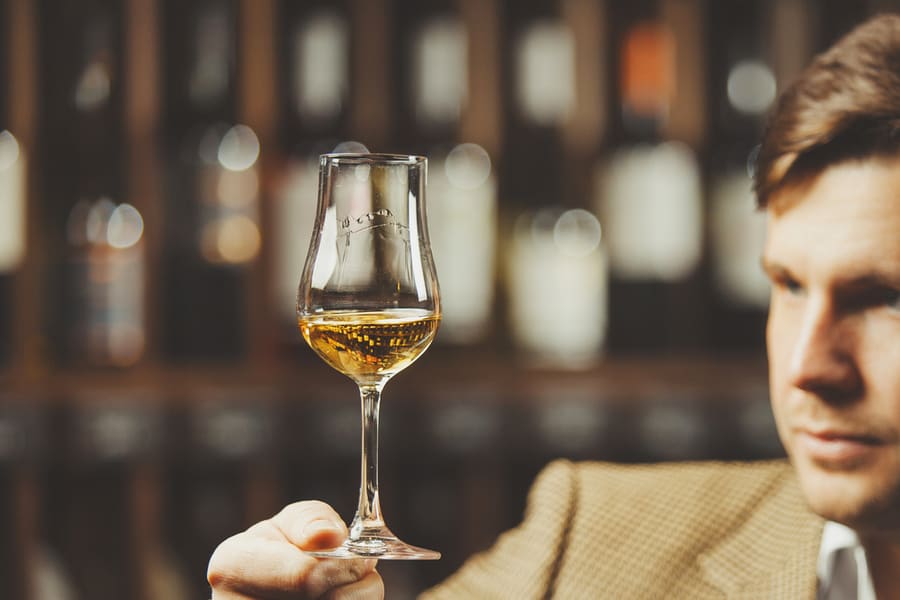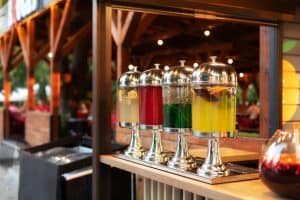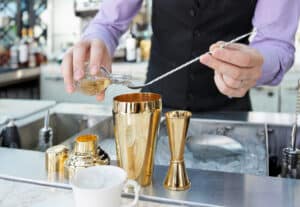
The world of whiskey is fascinating and filled with all kinds of flavors. From sweet and light to dark, heavy, and smokey— a rainbow of ambrosial tastes. But sometimes, you need an expert to guide you.
This is where the whiskey sommelier enters. Although it is not a recognized term in the whiskey world, for lack of a better term, it is a good catch-all term when referring to a whiskey professional.
How do you become a whiskey sommelier?
Regrettably, there is no international course dedicated to becoming a whiskey sommelier. But there are still many courses one can take to become a whiskey sommelier or expert. There is also a dedicated course to becoming a bourbon steward, endorsed and recognized by the Kentucky Distillers’ Association.
Read on as below we’ll look at the role of a whiskey sommelier and some courses offered on becoming one yourself.
We will use whiskey as an umbrella term throughout to include both Scottish (Canadian and Japanese) whisky and Irish and American (and other producing nations) whiskey. Also, it includes other styles of whiskey such as bourbon, single malt, single grain, and blended whiskies.
What Is a Whiskey Sommelier?

The whisk(e)y sommelier is a trained professional who helps you make your whiskey experience more enjoyable.
A sommelier offers recommendations on whiskies suited to your tastes, whiskey, and food pairings. The sommelier will also engage as many senses as possible to enhance your whiskey-drinking experience.
This includes presenting the whiskey in the correct glasses, serving each whiskey at the correct temperature, offering recommendations on whether to add water or rather an ice ball to a particular style of whiskey, explaining the origin of the whiskey, and focusing on each one’s unique attributes.
They also guide you to the tastes you can expect in your dram.
In short, a whiskey sommelier is a whiskey expert who shares their knowledge with you to give you the best possible whiskey-drinking experience. Whiskey sommeliers also help restaurants and bars by training their staff or designing a whiskey menu.
A sommelier can also aid menu designers and chefs with whiskey recommendations for their menus where both the food and whiskey complement each other.
Becoming a Whiskey Sommelier

It’s important to ignore the hype about becoming a whiskey sommelier. Sommeliers are found especially in the wine industry and have spent many decades perfecting their skills and palates.
To give you an idea, many wine professionals take the Master Sommelier course each year and fail—in the forty-five-year history of the Master Sommelier test, only 230 sommeliers have made it on their first try.
Unfortunately, the term Whiskey Sommelier is a made-up term. I am sorry.
Almost everyone knows what a sommelier is. With the term whiskey appended to it, you understand what the term involves—a professional who knows whiskey. Not a novice talking about whiskey.
There is, however, another (acknowledged) title in America: Certified Bourbon Steward. We’ll look at it a bit later.
To become a whiskey expert, our recommendation would be to seek a training course that meets your interests.
Some courses focussing specifically on whiskey are:
- Edinburgh Whisky Academy: they do not offer a sommelier course, but they offer in-depth courses about Scottish and Irish whisky. Look at their certificates and diplomas or sign up for one of their free classes. They also offer courses around the world through accredited providers.
- Whisky Marketing School: is a part of the Wizard Academy in Austin, Texas. Offering courses for proprietors, bartenders, and whiskey enthusiasts. They also offer five levels of certification. While the first course attracts an extremely hefty price tag of $4 000, remember that you will stay on the campus for three days, all meals are included, and they also include all the whiskeys and training in the price.
- The Society of Wine Educators: also offers an exam to become a Certified Specialist in Spirits, among a host of other courses and exams. This exam, quoting from their website: “tests the candidate’s knowledge of knowledge and mastery of key elements within the world of distillation and spirits production.” It is also widely recognized, offering a stepping stone to promotions.
Initially, I was reluctant to link the following article because of its somewhat negative nature and potent feelings (there are back-and-forth attacks, read it at your own peril). But I feel one has to offer a balanced overview of the subject.
It is up to you to decide. Whether you want to sharpen your whiskey nose and palate, kick-start your career, or jump for a promotion—the course you choose to become a whiskey expert or sommelier is up to you.
Remember, whiskey is to be enjoyed. With the knowledge gained from courses and certifications, you can share the joy of whiskey with people. And even get paid to do it.
Become a Certified Bourbon Steward

The world of wine has sommeliers. We find cicerones in the beer industry. The bourbon industry now has stewards.
The Stave & Thief Society launched the Certified Bourbon Steward certification in 2014 and is the world’s only industry-backed and -recognized bourbon certification.
They often compare this certification to sommelier and cicerone certifications, but specializing in bourbon, and nothing but bourbon.
There are two levels of certification: Basic and Executive.
Basic Level Certification
The Basic level certification is a self-study program for all bourbon enthusiasts and frontline hospitality staff.
You take an online test when you have worked your way through the study guide, and you feel comfortable. You will learn the science behind distilling and aging bourbon.
Further, you will also learn about training the senses (seeing, tasting, and smelling especially) and flight building. In-flight building, you will learn how to build a virtual flight of three bourbons.
And show the relationship among those products and be able to describe their characteristics, nose, and taste notes. You will also learn about bourbon’s history and what makes it different from whiskey.
Executive Level Certification
During the Executive course, you will gain hands-on experience if you desire, but attending a day-long workshop at a distillery.
They also designed the executive course to be self-paced but include a 36-piece bourbon sensory training kit which will help you develop your senses. This course is much more in-depth.
It will teach you about bourbon’s relationship to other whiskeys, discuss the different flavors and aromas found in bourbons, and equip you with the tools you need to build bourbon flights and tastings.
Conclusion
Although there isn’t technically such a thing as a whiskey sommelier, the term helps define whiskey professionals. It is a useful term, and language is ever-evolving.
The term can be taken up in English. Be that as it may, whiskey experts and professionals may soon adopt the term.
To become a whiskey sommelier, you will need to complete in-depth courses and learn about whiskey. The more you know, the more you want to know! That’s what whiskey does to you—it draws you in, and as your palate develops, you want to experience everything the world of whiskey offers.
Whiskey is a world on its own, and with the courses we highlighted, you will soon be on your way to becoming a whiskey expert. Or, if you like to expand your repertoire, become a certified Bourbon Steward.
It is up to you where you want to take your whiskey journey. Attend some courses to expand your knowledge, or step up your knowledge and pursue a promotion.







